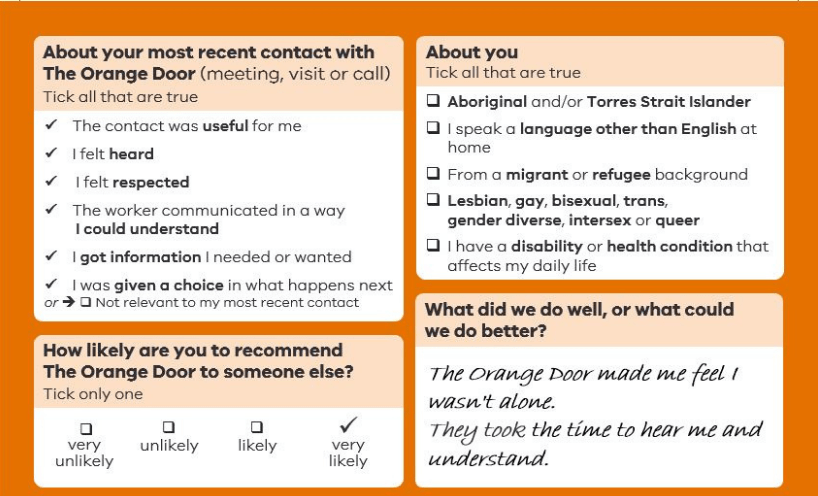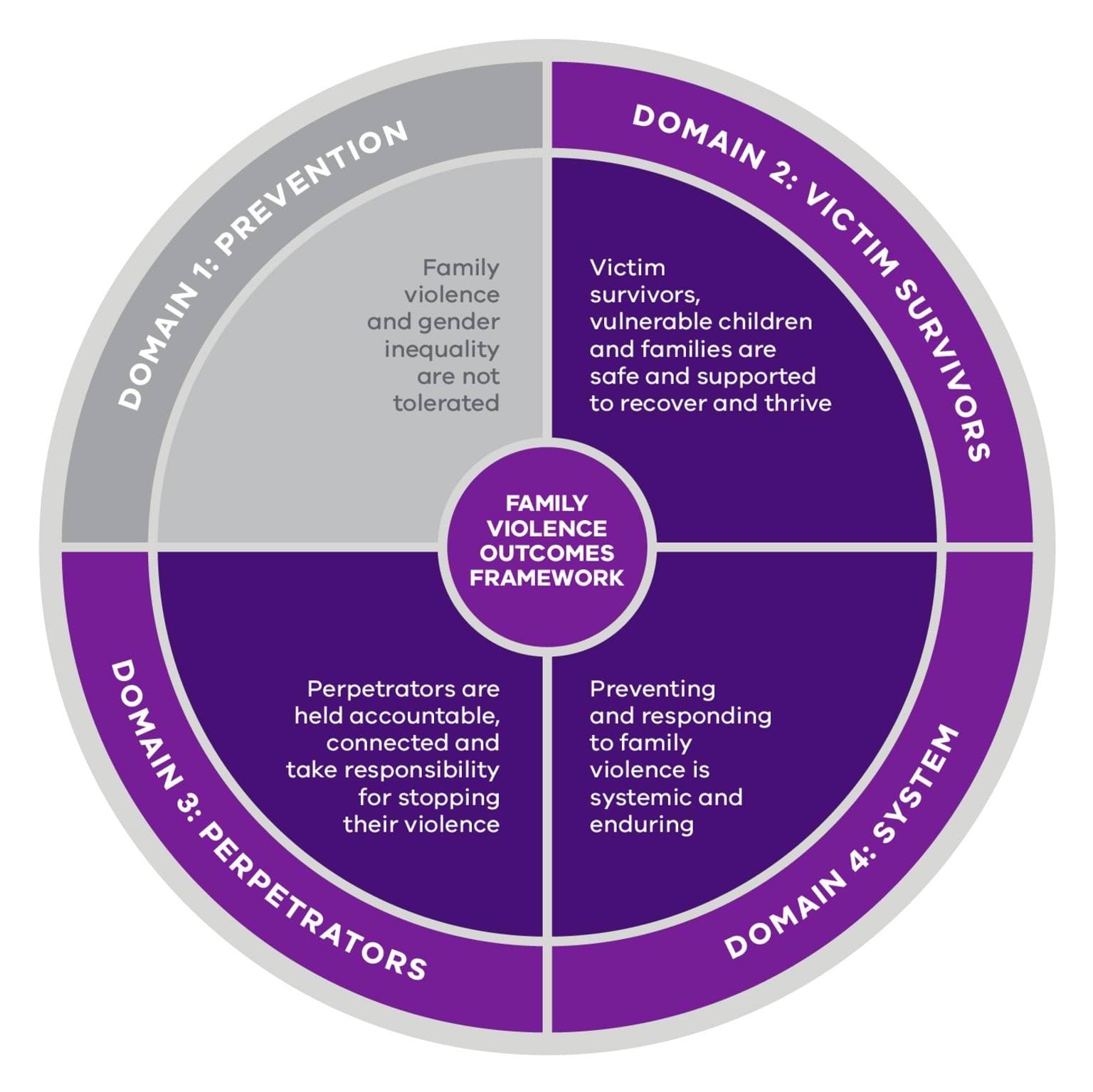We thought it was a family violence case so I took the lead; it ended up being more child support. I kept the case and worked closely with the children’s worker. We got seven services involved but because I shared information the woman only needed to tell her story once.
Building momentum
Family Safety Victoria is leading the statewide rollout of The Orange Door network, referred to in the Royal Commission’s recommendations as support and safety hubs.
The Orange Door network aims to be accessible, safe and welcoming, providing quick and simple access to support for:
- adults, children and young people who are experiencing family violence
- families who need support with the care and wellbeing of children and young people
- perpetrators of family violence
Since opening in 2018, more than 100,000 Victorians have received help and support from The Orange Door network.
It brings together services as a partnership, so that individuals and families don’t have to go to multiple services or to retell their story multiple times to have their needs met.
The Orange Door network provides initial support to those in need. Services available through the network include:
- risk and needs assessment
- safety planning
- crisis support
The network can connect people to a range of services that provide ongoing safety and wellbeing supports.
Perpetrator accountability is also a strong focus, The Orange Door network engages perpetrators and works with the system, to hold them accountable for their actions and changing their behaviour.
This video is a glimpse into the services The Orange Door network provides and coordinates.
The Orange Door network is now operating in seven of the 17 Department of Health areas in Victoria:
- the latest two opened in the Central Highlands and Loddon in late 2020
- the Goulburn area is next
- a further six areas are set to open in 2021
- statewide coverage will be complete by 2022
Access to The Orange Door network in each local area is facilitated through the establishment of an Orange Door network primary site. Area-wide coverage is supported by two to three access points, outposted services and outreach. Telephone and email options for referrals and to access supports complete the network.
Several reviews have been conducted since The Orange Door network began operations in 2018. The outcomes of those reviews, together with operational experience, are informing our approach as we extend our operations into new areas.
A 2020 audit of The Orange Door network by the Victorian Auditor-General made nine recommendations for improvement.
Family Safety Victoria accepted all nine recommendations. Actions which address the Auditor-General’s recommendations are highlighted in the activities tables (Delivery to 2023 on this page).
Acknowledging the foundations
The Royal Commission found that collaboration between services that support people affected by family violence was difficult and inefficient. And when practitioners worked in isolation they had a limited view of the risks that victim survivors faced.
The Orange Door network is a flagship project of the Victorian Government’s family violence reform following the 2016 Royal Commission into Family Violence. It has been designed to support the Victorian Government’s wide-ranging social policy reform agenda which aims to strengthen support to children and families.
These reforms share the common objectives of achieving a service system for individuals and families that is more connected, better able to intervene before a situation reaches crisis point, and to seamlessly connect clients with the right services at the right time.
The Orange Door network enables practitioners with different specialisations to learn from and with each other, drawing on each other’s knowledge and experience. This provides an integrated assessment of risk and needs, and the ability to take a whole-of-family approach.
The Orange Door network provides cohesiveness of response to victim-survivors of family violence. The network reflects excellent collaborative practice between government agencies, police and non-government services
Progress since 2016
The key activities for The Orange Door network which have been delivered since the Royal Commission are grouped here into three areas.
Delivery to 2023
This overview of our planned activities to 2023, includes actions in response to the VAGO audit and is grouped into five areas. Our program for the next three years will enable The Orange Door network to realise its full potential and will result in better outcomes.
An iterative learning approach will ensure that Family Safety Victoria maintains its focus on continuous improvement.
Actions in response to VAGO recommendations are indicated with an asterisk (*) in the activities tables.
Connecting The Orange Door network across the reform
The Orange Door network is a transformational component of our service system.
The network works with and is influenced by initiatives and activities across related reforms. Key connections include:
Multi-Agency Risk Assessment and Management (MARAM)
-
family violence framework and tools for The Orange Door network workforce
Family Violence Information Sharing Scheme (FVISS) and Child Information Sharing Scheme (CISS)
- information sharing legislation
MARAM and information sharing help identify, assess and manage family violence risk and promote child wellbeing and safety.
These enablers are critical for the assessment of perpetrator risk and risk management, which is core day-to-day business for workers in The Orange Door network.
Perpetrators who engage with The Orange Door network are supported to connect with services that work with them on behaviour change.
Reform-wide priorities
Activities to establish The Orange Door network are informed by our reform-wide priorities of intersectionality, Aboriginal self-determination and lived experience.
Intersectionality
We have designed The Orange Door network to provide inclusive, responsive and accessible services for individuals of any age, gender, ability, sex, sexuality, culture or religion.
The government’s Everybody Matters: Inclusion and Equity Statement provides guidance to the family violence system to foster inclusive, safe, responsive and accountable services.
Family Safety Victoria has developed an Inclusion Action Plan for The Orange Door network to embed inclusion, access and equity in services and policies, and to build the capacity of workers to respond to community members from diverse cohorts by applying an intersectional lens.
Aboriginal self-determination
The Orange Door network commits to embedding Aboriginal self-determination and works with Aboriginal communities and services with the aim of ensuring Aboriginal people receive culturally safe and appropriate service responses.
The principles of self-determination are embedded into practice by:
- Aboriginal representation in the governance of The Orange Door network, including Hub Leadership Groups and the establishment of Aboriginal Advisory Groups in each area
- providing a choice in Aboriginal specific or broader service responses
- embedding cultural safety for clients and staff of The Orange Door network
- employing Aboriginal Practice Leaders and workers in every area to provide additional support for Aboriginal clients.
- the development of the Concept Model and co-design of the service design elements of Aboriginal Access Points which will provide an alternative service pathway for Aboriginal Victorians experiencing or using family violence
- development of the Aboriginal Inclusion Action Plan, a three-year plan to embed inclusion, access and equity in The Orange Door network
Self-determination in implementation of The Orange Door network was overseen and supported by the Dhelk Dja Partnership Forum and its sub-working groups.
Lived experience
The lived experience of people affected by family violence and who require support with the care, development and wellbeing of children, continues to inform service design, development and planning processes for The Orange Door network.
The Client Partnership Strategy outlines a suite of actions to move towards greater client partnership, in all aspects of service design, development and delivery. This includes increasing client representation in governance, reference and advisory groups.
The Client Voice process is also gradually being introduced to capture information about the client experience of The Orange Door network to inform continuous improvement.
This image of the Client Voice Survey shows the questions a client is asked when they have had contact with The Orange Door network.
A second evaluation of The Orange Door network in 2022 will seek to determine the impact and benefits of the service model for clients and gain critical insights into client experience and outcomes for victim survivors, perpetrators and families.
Measuring outcomes
Family Violence Outcomes Framework
Delivering the activities for this priority area will likely have the greatest impact in achieving outcomes against the following domains:
Royal Commission recommendations
The Victorian Government has committed to implement all 227 recommendations from the Royal Commission into Family Violence.
Of the recommendations still in progress, six relate to The Orange Door network. NOTE: The Royal Commission referred to these as Support and Safety Hubs in their report.
Summary of activities to 2023
Updated

